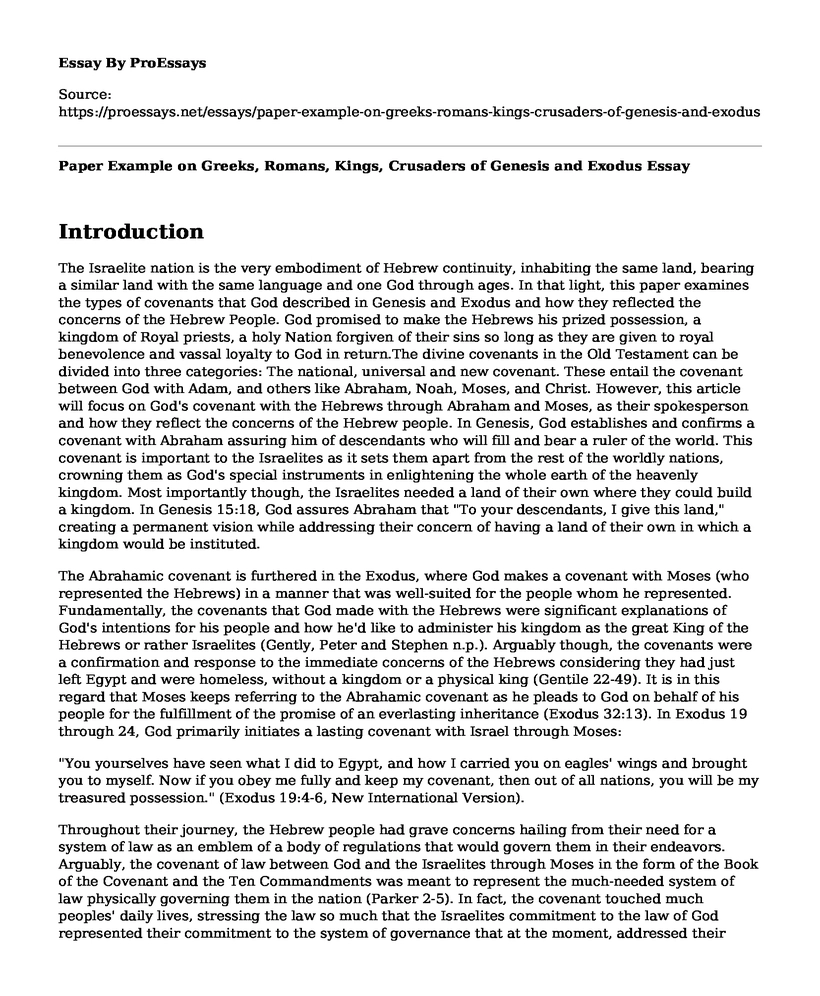Introduction
The Israelite nation is the very embodiment of Hebrew continuity, inhabiting the same land, bearing a similar land with the same language and one God through ages. In that light, this paper examines the types of covenants that God described in Genesis and Exodus and how they reflected the concerns of the Hebrew People. God promised to make the Hebrews his prized possession, a kingdom of Royal priests, a holy Nation forgiven of their sins so long as they are given to royal benevolence and vassal loyalty to God in return.The divine covenants in the Old Testament can be divided into three categories: The national, universal and new covenant. These entail the covenant between God with Adam, and others like Abraham, Noah, Moses, and Christ. However, this article will focus on God's covenant with the Hebrews through Abraham and Moses, as their spokesperson and how they reflect the concerns of the Hebrew people. In Genesis, God establishes and confirms a covenant with Abraham assuring him of descendants who will fill and bear a ruler of the world. This covenant is important to the Israelites as it sets them apart from the rest of the worldly nations, crowning them as God's special instruments in enlightening the whole earth of the heavenly kingdom. Most importantly though, the Israelites needed a land of their own where they could build a kingdom. In Genesis 15:18, God assures Abraham that "To your descendants, I give this land," creating a permanent vision while addressing their concern of having a land of their own in which a kingdom would be instituted.
The Abrahamic covenant is furthered in the Exodus, where God makes a covenant with Moses (who represented the Hebrews) in a manner that was well-suited for the people whom he represented. Fundamentally, the covenants that God made with the Hebrews were significant explanations of God's intentions for his people and how he'd like to administer his kingdom as the great King of the Hebrews or rather Israelites (Gently, Peter and Stephen n.p.). Arguably though, the covenants were a confirmation and response to the immediate concerns of the Hebrews considering they had just left Egypt and were homeless, without a kingdom or a physical king (Gentile 22-49). It is in this regard that Moses keeps referring to the Abrahamic covenant as he pleads to God on behalf of his people for the fulfillment of the promise of an everlasting inheritance (Exodus 32:13). In Exodus 19 through 24, God primarily initiates a lasting covenant with Israel through Moses:
"You yourselves have seen what I did to Egypt, and how I carried you on eagles' wings and brought you to myself. Now if you obey me fully and keep my covenant, then out of all nations, you will be my treasured possession." (Exodus 19:4-6, New International Version).
Throughout their journey, the Hebrew people had grave concerns hailing from their need for a system of law as an emblem of a body of regulations that would govern them in their endeavors. Arguably, the covenant of law between God and the Israelites through Moses in the form of the Book of the Covenant and the Ten Commandments was meant to represent the much-needed system of law physically governing them in the nation (Parker 2-5). In fact, the covenant touched much peoples' daily lives, stressing the law so much that the Israelites commitment to the law of God represented their commitment to the system of governance that at the moment, addressed their concerns to which they committed in Exodus 19:7-8 "We will do everything the Lord has said."
Summarily, God did much for the Hebrews while in Egypt and during the exodus but in return, the support warranted some specific sacrifices to appease his continued care and provision. In some instances, therefore, as in Exodus 19, God demands of his people royal benevolence, and vassal loyalty. God commanded the Hebrews to offer animal sacrifices for individual experiences of forgiveness of sin (Elazar n.p.). Clearly, the animal sacrifice was a representative substitute of the sinner foreshadowing the Christ-like sacrifice. Karbanot is the Hebrew word for the Jewish ritual of sacrifice. Some of the rituals included the offering of Karbanot which translates to "to draw near" were exclusively performed by the priests (Kohanim). The sacrifices represented important concepts of the element of loyalty, submission to God' ruling power, dependence on God as well as royalty which entailed setting themselves apart from the rest of the World to bring the heavenly kingdom down to the entire world.
Works Cited
Elazar, Daniel Judah. Covenant as the basis of the Jewish political tradition. Center for the Study of Federalism, Temple University, 1979.
Gentry, Peter J., and Stephen J. Wellum. Kingdom through Covenant: A Biblical-Theological Understanding of the Covenants. Crossway, 2012.
Gentile, Jesse. Biblical Covenants: The Promises of God that unite all of Scripture. Pp. 1-184, 2018. Web. 30 Sept. 2018.
Jared T. Parker, "Cutting Covenants," in The Gospel of Jesus Christ in the Old Testament, The 38th Annual BYU Sidney B. Sperry Symposium (Provo, UT: Religious Studies Center, Brigham Young University, 2009).
Cite this page
Paper Example on Greeks, Romans, Kings, Crusaders of Genesis and Exodus. (2022, Aug 17). Retrieved from https://proessays.net/essays/paper-example-on-greeks-romans-kings-crusaders-of-genesis-and-exodus
If you are the original author of this essay and no longer wish to have it published on the ProEssays website, please click below to request its removal:
- Cold War History Assignment Paper Example
- Rhetorical Analysis of Martin Luther King Jr: "I Have a Dream" Speech
- Essay Sample on Reconstruction and Industrialization in America
- Essay on the Election of Lincoln: A Turning Point in the American Civil War
- French Colonialism & Nigerian Independence Movements - Essay Sample
- Essay Example on Stanzas on Freedom: Slavery as a Universal Issue
- Essay Example on Ancient Iron: From Rare to Revolutionary







